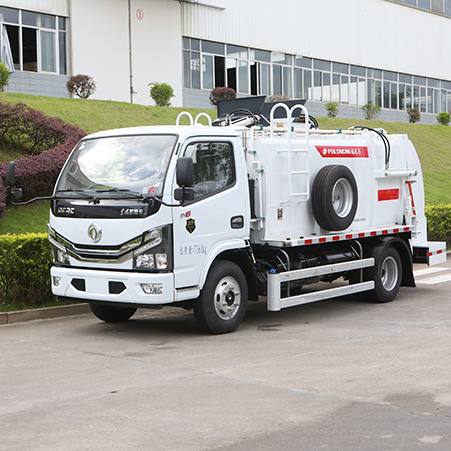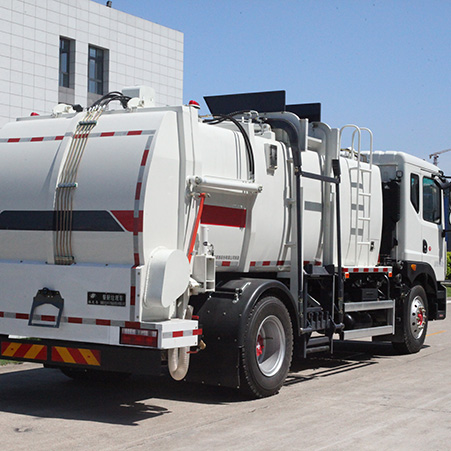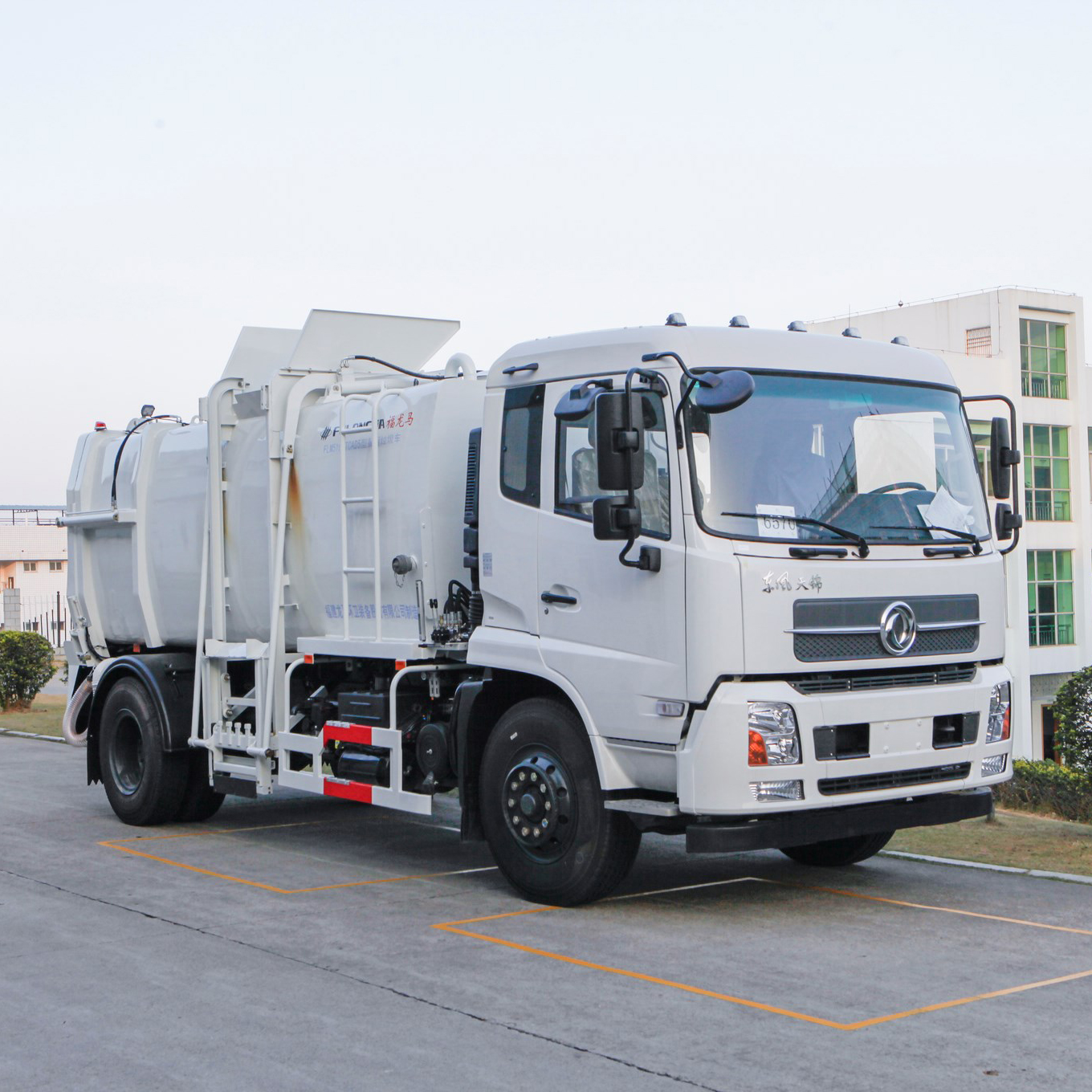Cities are increasingly adopting advanced technologies and innovative approaches to handle waste, reduce landfill reliance, and promote recycling and composting. Yet, despite these efforts, the reliance on fossil-fuel-powered vehicles remains a significant roadblock to achieving truly sustainable urban environments.
Electric kitchen garbage trucks are transforming the landscape of urban waste management. These vehicles, designed to collect and transport waste from residential and commercial kitchens, operate on electric power rather than traditional fossil fuels. This shift towards electrification is not just a trend but a necessity driven by the urgent need to reduce urban pollution and enhance the efficiency of waste management systems.

What are Electric Kitchen Garbage Trucks?
Electric kitchen garbage trucks are specialized waste collection vehicles powered entirely by electricity. Unlike traditional garbage trucks, which rely on diesel engines, these electric trucks use batteries to operate, eliminating the need for fossil fuels. They are designed specifically for the collection and transportation of kitchen waste, which often includes food scraps, organic matter, and other biodegradable materials.
These trucks typically feature advanced battery technology, allowing for extended operation on a single charge. They are equipped with efficient electric motors and innovative waste compaction systems, ensuring they can handle substantial loads without compromising performance. Additionally, many electric kitchen garbage trucks incorporate smart technologies for route optimization, further enhancing their efficiency and reducing operational costs.
Technological Innovations in Electric Kitchen Garbage Trucks
The advent of electric kitchen garbage trucks has brought forth a wave of technological innovations aimed at improving efficiency, performance, and environmental impact. Some of the key innovations include:
- Advanced Battery Systems: Modern electric garbage trucks utilize high-capacity lithium-ion batteries, offering longer ranges and faster charging times. These batteries are designed to endure the rigorous demands of waste collection routes.
- Regenerative Braking: This technology allows trucks to recover energy during braking, extending the range of the vehicle and reducing energy consumption.
- Smart Routing and Fleet Management: Integrated GPS and telematics systems enable real-time tracking and route optimization, ensuring that garbage collection is efficient and minimizing unnecessary mileage.
- Automated Waste Sorting: Some electric kitchen garbage trucks are equipped with automated sorting mechanisms that segregate recyclables from organic waste, streamlining the waste management process and enhancing recycling rates.
- Quiet Operation: Electric motors are significantly quieter than diesel engines, reducing noise pollution and improving the quality of life in urban areas.
Environmental Benefits
The environmental benefits of electric kitchen garbage trucks are substantial. By eliminating the use of diesel fuel, these vehicles help reduce air pollution, cutting down on harmful emissions such as carbon dioxide (CO2), nitrogen oxides (NOx), and particulate matter. This reduction in emissions is crucial for combating climate change and improving air quality in densely populated urban areas.
Furthermore, the use of electric trucks contributes to a decrease in noise pollution, making cities quieter and more pleasant to live in. The regenerative braking systems and energy-efficient designs also minimize the overall energy consumption of waste collection operations, promoting a more sustainable use of resources.
Economic Benefits
In addition to their environmental advantages, electric kitchen garbage trucks offer significant economic benefits. Although the initial investment in electric vehicles may be higher, the long-term savings are considerable. These savings arise from:
- Lower Fuel Costs: Electricity is generally cheaper than diesel, resulting in lower operating costs for electric trucks.
- Reduced Maintenance Costs: Electric vehicles have fewer moving parts and require less maintenance than their diesel counterparts, leading to lower maintenance and repair expenses.
- Incentives and Grants: Many governments offer incentives, grants, and tax breaks for the adoption of electric vehicles, offsetting the initial purchase cost.
- Longer Lifespan: Electric vehicles often have a longer lifespan due to their simpler mechanical structure and fewer components subject to wear and tear.
These economic benefits make electric kitchen garbage trucks an attractive investment for municipalities and waste management companies looking to enhance efficiency and sustainability.
Improving Urban Living Conditions
The transition to electric kitchen garbage trucks significantly improves urban living conditions. Cleaner air and reduced noise pollution create healthier and more enjoyable environments for city residents. Additionally, the reduction in greenhouse gas emissions helps mitigate the impacts of climate change, contributing to the long-term sustainability of urban areas.
Moreover, the adoption of electric vehicles in waste management sets a positive example for other sectors, encouraging broader adoption of green technologies and sustainable practices. This ripple effect can lead to widespread environmental and economic benefits, fostering a culture of sustainability in urban communities.
Conclusion
Electric kitchen garbage trucks are at the forefront of a revolution in urban waste management. They offer a compelling solution to the challenges posed by traditional diesel-powered vehicles, delivering substantial environmental and economic benefits while enhancing urban living conditions. As cities worldwide continue to grow and evolve, the adoption of electric road maintenance vehicles will be crucial in building sustainable, resilient urban environments.
By embracing these innovative technologies, cities can pave the way for a cleaner, greener future, demonstrating that sustainable waste management is not only possible but also advantageous for all. The journey towards sustainable urban living is a collective effort, and electric kitchen garbage trucks are leading the way.
FAQs
How do electric kitchen garbage trucks compare in performance to traditional diesel trucks?
Electric kitchen garbage trucks are comparable in performance to traditional diesel trucks, with the added benefits of lower emissions, reduced noise, and lower operating costs. Advanced battery technology and smart systems ensure they can handle the same workloads efficiently.
What are the main challenges in transitioning to electric kitchen garbage trucks?
The primary challenges include the initial cost of purchasing electric trucks, the need for adequate charging infrastructure, and ensuring sufficient battery range for longer routes. However, these challenges are being addressed through technological advancements and supportive government policies.
How do electric kitchen garbage trucks contribute to sustainability?
Electric kitchen garbage trucks contribute to sustainability by reducing greenhouse gas emissions, lowering noise pollution, and decreasing reliance on fossil fuels. They promote cleaner air, healthier urban environments, and a reduction in the overall carbon footprint of waste management operations.







